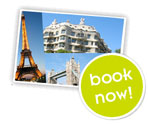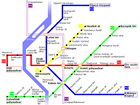André Kertész, Martin Munkácsi, Robert Capa, Bassai and László Moholy-Nagy
ZARAGOZA, September 29, 2011 (EUROPA PRESS)
Ibercaja Social Work has presented the exhibition "Masters of Photography Hungarian ', an exhibition that includes 74 pieces of André Kertész, Martin Munkácsi, Robert Capa, Brassai and Laszlo Moholy-Nagy, and arrives in Spain for the first time.
This is an exhibition, which runs until 31 December at the Patio de la Infanta de Zaraoza, which will see the images of these five photographers Hungarian great figures of twentieth-century universal picture. The photographs were taken between 1917 and 1970.
Of the 74 images, 24 are Kertész, 13 Munkácsi, 14 Layer, 3 and 20 Brassaï Moholy-Nagy. This exhibition, which was carried out thanks to Canopy, has been curated by Zoltán Balázs Peter Baki and Tóth, and is composed of museum collections Fotográfiai Hungarian Magyar Múzeum.
The five photographers who star in this exhibition were Jews born in Hungary in exile contributed to the technical and aesthetic development of photography.
The Director of Social Work Ibercaja, Teresa Fernandez, pointed out that "it is wonderful to bring together five photographers Hungarians have been a milestone for photography."
For his part, Ambassador of Hungary, Edit Bucsi, highlighted "the importance my country attaches to expose and bring public to another Hungarian cultural heritage."
In addition, this exhibition provides an opportunity to promote the idea of European cultural diversity, because "we believe that culture is part of our lives," said Bucsi.
The head of Education and Culture Ibercaja, Magdalena Lasala, it will appreciate as an art of photography "has become all the possibilities of capturing the reality and evidence."
Of the 74 works are presented in the Aragonese capital, many have become symbols that they send a message to society, showing a portrait of Europe.
Lasala has commented that with this exhibition "is likely a nod to Europe's memory conserve much needed" for the knowledge of current history.
In this sense, the photograph acts as "the main instrument to reflect what happens in society," with a sample of images that "catch the mood and the viewer's eye," Lasala considered.
The presentation of this sample also participated Canopy Management director, Elena Navarro, who added that since his company "is to assist in the transmission of culture", with this collaborative project between Spain and a foreign country.
Hungarian photographer FIVE
This exhibition will showcase the work done between 1917 and 1970 by five figures universal photography.
André Kertész (1894-1985), was released by the spontaneity of urban shots with his camera and obtained its modern distorted nudes. He worked in New York as a fashion photographer and interiors for prestigious magazines.
On the other hand, László Moholy-Nagy (1895-1946), was an artist who played a key role in the relationship between photography and avant-garde art. In addition, noted for his penchant for grinding and aerial shots, linked to experimental films of his contemporaries.
Munkácsi Martin (1896-1963), is a photographer who first introduced the sport, photojournalism, fashion and pure plastic search in your photographs, inspired by the New Objectivity, a movement leading Berlin.
Another of the protagonists of the exhibition is Brassaï (1899-1984), who devoted himself to photography, writing, drawing, sculpture and cinema, a versatile artist who also became interested in portraits.
Finally, Robert Capa (1913-1954), is of the five best known in Spain, was the father of photojournalism, and founder of Magnum, which he chaired between 1951 and 1954.
'Masters of Photography Hungarian', which opens this Thursday at 20.00, can be visited in the Patio de la Infanta Ibercaja until 31 December.
Visiting hours will be Monday to Friday from 18.00 to 21.00, Saturday 11.00 to 14.00 and from 18.00 to 21.00 Sundays and holidays from 11.00 to 14.00.


